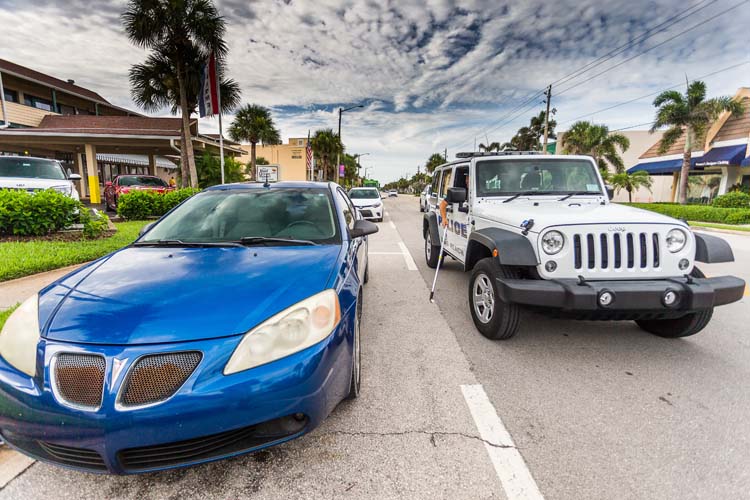
A federal appeals court decision in Ohio last week will not stop the Vero Beach Police Department’s parking enforcement unit from leaving its mark around town.
Police Chief David Currey said he’s aware of the 6th Circuit Court of Appeals’ ruling, which stated that law enforcement’s chalking of tires to enforce parking regulations violates the Fourth Amendment’s ban on unreasonable search because the officer trespasses on the vehicle to make the marks.
But his officers will continue to chalk the tires of cars parked in the beachside business district and in downtown Vero Beach to enforce the city’s two- and three-hour time limits.
“We’re certainly aware of the ruling, and we’re going to keep an eye on it,” Currey said. “But we’re in the 4th Circuit, which is pretty far south of there, so it hasn’t impacted us.
“I find it interesting, though, that you tap a tire with chalk and you’re equating that to using GPS,” he added. “That’s going a little too far.”
Currey was referring to a 2012 U.S. Supreme Court case in which the justices overturned the conviction of a man who was prosecuted using data from a GPS tracker that police had secretly attached to his car without obtaining a warrant.
The justices unanimously ruled the man’s Fourth Amendment rights were violated, though they were divided as to why.
The ruling by the 6th Circuit’s three-judge panel was in response to the case of Michigan woman who sued the city of Saginaw after she received 15 parking tickets in three years, all of them written by the same officer.
The judges reversed a U.S. District Court’s dismissal of the suit and sent the case back to the lower court in Bay City, Mich., for trial. Their ruling is legally binding only in the four states covered by the 6th Circuit – Michigan, Ohio, Kentucky and Tennessee.
The Vero Beach City Council authorized in March a parking study to analyze parking problems in the Central Beach business district, especially along Ocean Drive, and recommend ways to solve them.
A preliminary report is expected this week.
Currey said his department has explored the possibility of switching to license-plate recognition (LPR) systems and electronic-chalking devices that scan and record the position of a tire’s valve stem – “I hope THAT’s allowed,” he deadpanned – but both would be significantly more costly than actual chalk.
“We’re cognizant of what’s going on and we’re already looking at alternatives that we’ll share with the city manager and, in time, the City Council,” Currey said. “In the meantime, we’re getting legal advice from our attorney.”
As for complaints about parking – from merchants, residents and visitors – Currey said they’ve been few and far between.
“The community is growing, we’re getting more visitors every year and there are only so many parking spaces over there,” he said, “but, in terms of complaints, this has been the quietest season that I’ve had.”



